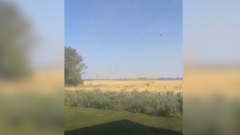
A deadly attack which left 26 tourists dead in Kashmir has heightened tensions between India and Pakistan again.
India accused Pakistan of supporting ‘cross-border terrorism’ on Wednesday night and imposed diplomatic measures, including downgrading diplomatic ties, suspending a key water-sharing treaty and closing the main land border crossing with Pakistan.
Pakistan has denied the accusations from India, and a previously unknown militant group calling itself Kashmir Resistance has claimed responsibility for the attack.
In a statement issued on Thursday, India’s foreign ministry said all visas issued to Pakistani nationals will be revoked with effect from Sunday. It also advised Indian citizens not to travel to Pakistan.
In retaliation, Pakistan cancelled visas for Indian nationals, closed its airspace for all Indian-owned or Indian-operated airlines, and suspended all trade with India, including to and from any third country.
Here’s everything you need to know.
Why are tensions so high?

Diplomatic ties between the two countries were already weak, particularly after India revoked Kashmir’s semiautonomous status in 2019.
India and Pakistan are both in charge of differing parts of Kashmir, but both claim the territory in its entirety.
The two sides have long accused each other of backing forces to destabilise one another, and New Delhi describes all militancy in Kashmir as Pakistan-backed terrorism.
Pakistan denies this, and many Muslim Kashmiris consider the militants to be part of a home-grown freedom struggle.
What happened at Palagham?

On April 22, 26 people were shot dead after gunmen opened fire on visitors at a popular tourist spot in Indian-controlled Kashmir.
Police have described the incident as a ‘terror attack’ and blamed militants fighting against Indian rule in Pahalgam, known as India’s ‘Mini Switzerland’.
Two senior police officers said at least four gunmen, whom they described as militants, fired at dozens of tourists from close range.
The officers said at least three dozen people were wounded, many of them reported to be in serious condition.
What is the Indus Water Treaty?

The Indus Water Treaty, brokered by the World Bank in 1960, allows for sharing the waters of a river system that is a lifeline for both countries, particularly for Pakistan’s agriculture.
The treaty has survived two wars between the countries, in 1965 and 1971, and a major border skirmish in 1999.
After the attack in Kashmir, India has suspended the treaty with Pakistan, but Pakistan has said India doesn’t have the power to do so, because the World Bank has a stake in it.
Six rivers are involved in the treaty. India has control over the Sutlej, Beas and Ravi rivers, whilst Pakistan has the Indus, Jhelum and Chenab.
What have politicians said?

India said a number of Pakistani diplomats were asked to leave New Delhi, and Indian diplomats were recalled from Pakistan.
Diplomatic missions in both countries will reduce their staff from 55 to 30 as of May 1, India’s foreign secretary, Vikram Misri, announced Wednesday night.
Mr Misri also said the only functional land border crossing between the countries would be closed.
Some fear New Delhi may move beyond diplomatic sanctions as the country’s media and leaders from Prime Minister Narendra Modi’s Hindu nationalist ruling party call for military action.
What’s happened during other times of tension?
In 2019, when insurgents rammed a car packed with explosives into a paramilitary convoy, killing 40 soldiers, India claimed to strike a militant training camp inside Pakistan.
Pakistan responded with air raids, downed an Indian military aircraft and captured an Indian pilot who was later released.
Two years later, in 2021, the two countries renewed a previous ceasefire agreement along their border, which has largely held despite attacks on Indian forces by insurgents in Kashmir.
Get in touch with our news team by emailing us at [email protected].
For more stories like this, check our news page.







.jpg.webp?itok=1zl_MpKg)





 Bengali (Bangladesh) ·
Bengali (Bangladesh) ·  English (United States) ·
English (United States) ·